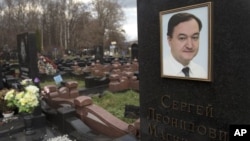WASHINGTON —
The U.S. House of Representatives has overwhelmingly passed legislation - by a vote of 365 to 43 - allowing permanent, normal trade relations with Russia.
The legislation, which now goes to the U.S. Senate, provides American businesses access to Russia’s newly-opened markets as a result of Moscow’s recent membership in the World Trade Organization.
Representative Dan Burton [a Republican from Indiana] told his colleagues this law will help U.S. companies that have been at a disadvantage in competing with their European and Asian counterparts.
“In order to join the WTO” said Burton, “Russia has been required to make substantial reforms, to open its economy to international investment. These reforms include significant cuts on tariffs impacting manufactured goods and agricultural products, as well as a pledge to cut farm subsidies in half by 2018.”
In order to grant Russia permanent normal trade relations, the House had to repeal the so-called Jackson-Vanik amendment to the 1974 Trade Bill.
That amendment, said Russia expert Robert Legvold, “was passed back in the Soviet period when the Soviets were limiting, in fact at one point cut off, any Jewish emigration. And the Jackson-Vanik amendment denied most favorite treatment and other economic benefits so long as that was true.”
Anders Aslund, with the Peterson Institute for International Economics, said the Jackson-Vanik amendment is a relic of the Cold War.
“It was focused on the Soviet Union, which no longer exists,” said Aslund. “Russia has had free emigration ever since it became independent. Russia and Israel have now visa-free travel between themselves. So it’s not at all relevant to its original purpose.”
While repealing the Jackson-Vanik amendment, the House of Representatives added human rights provisions to the Russian trade legislation.
Representative Jim McGovern [a Democrat from Massachusetts] said the measures are named after Russian lawyer Sergei Magnitsky, who “died on November 16, 2009, after enduring torture and beatings while imprisoned for blowing the whistle on the largest tax fraud in Russian history. He did the right thing and he paid for it with his life at the hands of brutal and corrupt Russian officials.”
Representative Howard Berman [a Democrat from California] said the “Magnitsky provisions would place restrictions on the financial activities and travel of Russians connected to various human rights violations. The names of these human rights violators would be publicly available unless the administration determines that the individual must be placed on a classified list, he added.
The Russian government has strongly criticized the Magnitsky provisions, saying they would have to react if the legislation becomes law. Russia, however, did not specify what those reactions would be.
The legislation now goes to the Senate for its consideration.
The legislation, which now goes to the U.S. Senate, provides American businesses access to Russia’s newly-opened markets as a result of Moscow’s recent membership in the World Trade Organization.
Representative Dan Burton [a Republican from Indiana] told his colleagues this law will help U.S. companies that have been at a disadvantage in competing with their European and Asian counterparts.
“In order to join the WTO” said Burton, “Russia has been required to make substantial reforms, to open its economy to international investment. These reforms include significant cuts on tariffs impacting manufactured goods and agricultural products, as well as a pledge to cut farm subsidies in half by 2018.”
In order to grant Russia permanent normal trade relations, the House had to repeal the so-called Jackson-Vanik amendment to the 1974 Trade Bill.
That amendment, said Russia expert Robert Legvold, “was passed back in the Soviet period when the Soviets were limiting, in fact at one point cut off, any Jewish emigration. And the Jackson-Vanik amendment denied most favorite treatment and other economic benefits so long as that was true.”
Anders Aslund, with the Peterson Institute for International Economics, said the Jackson-Vanik amendment is a relic of the Cold War.
“It was focused on the Soviet Union, which no longer exists,” said Aslund. “Russia has had free emigration ever since it became independent. Russia and Israel have now visa-free travel between themselves. So it’s not at all relevant to its original purpose.”
While repealing the Jackson-Vanik amendment, the House of Representatives added human rights provisions to the Russian trade legislation.
Representative Jim McGovern [a Democrat from Massachusetts] said the measures are named after Russian lawyer Sergei Magnitsky, who “died on November 16, 2009, after enduring torture and beatings while imprisoned for blowing the whistle on the largest tax fraud in Russian history. He did the right thing and he paid for it with his life at the hands of brutal and corrupt Russian officials.”
Representative Howard Berman [a Democrat from California] said the “Magnitsky provisions would place restrictions on the financial activities and travel of Russians connected to various human rights violations. The names of these human rights violators would be publicly available unless the administration determines that the individual must be placed on a classified list, he added.
The Russian government has strongly criticized the Magnitsky provisions, saying they would have to react if the legislation becomes law. Russia, however, did not specify what those reactions would be.
The legislation now goes to the Senate for its consideration.





